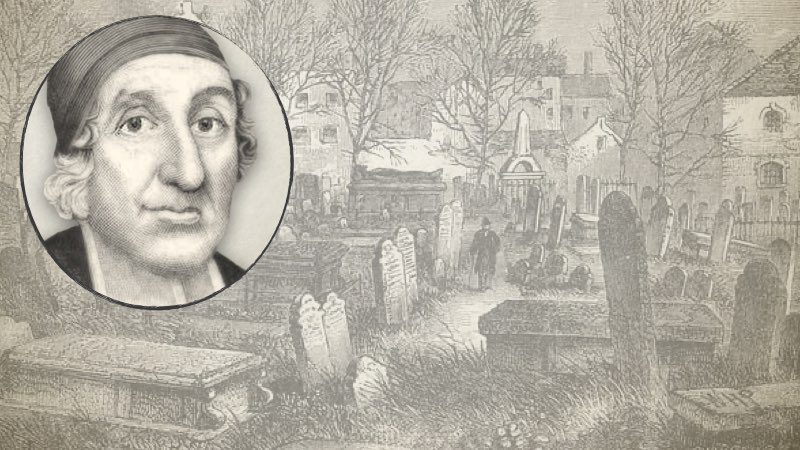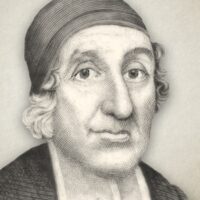
The Life And Ministry Of Hanserd Knollys
J. A. Jones, “Bunhill Memorials: Sacred Reminiscences Of Three Hundred Ministers And Other Persons Of Note, Who Are Buried In Bunhill Fields, Of Every Denomination” (1849):[1]
Hanserd Knollys, Baptist. The precise spot of ground where rest the remains of this eminent man of God, cannot now be pointed out. He died Sept. 19th, 1691, in the 93rd year of his age.
Hanserd Knollys was born about the year 1598, at Chalkwell, in Lincolnshire. He had the advantage of descending from religious parents, who took great care of his education, and had him instructed in the principles of religion and sound literature. For this purpose they maintained a tutor in their house till he was fit for the University, when they sent him to Cambridge. Though he had long been noticed for his pious dispositions, yet he attributed his effectual conversion to God, to some sermons he heard at Cambridge, preached by the Puritans. On leaving the University, he was presented by the Bishop of Lincoln, to the living of Humberstone; but this was held by him only two or three years, when he began to scruple the lawfulness of several church ceremonies, such as wearing the surplice, using the cross in baptism, &c., and he objected to the admission of notoriously wicked persons to the Lord’s Supper. Accordingly he resigned his living into the bishop’s hands, but continued to preach for two or three years longer in different parish churches, by the connivance of his diocesan. About the year 1636, he left the Church of England entirely, renounced his episcopal ordination, and joined himself to the Nonconformists, which exposed him to many difficulties and hardships. Not being suffered to preach any longer in Lincolnshire, he removed to London, where he was in great danger from the High Commission Court. Being followed by persecution, he sought shelter in America.
Upon his arrival at Boston, he was apprehended by virtue of a warrant from the High Commission Court, and confined for some time in a private house; but his serious discourse so terrified the conscience of his keeper, that he set open his door, and suffered him to depart. Mr. Knollys continued about five years in America; but being recalled by his aged father, he returned to London, in December, 1641. The dreadful massacre which deluged Ireland with blood during that year, was succeeded by the civil wars, which, in the following year burst forth between Charles I. and the Parliament. At this time Mr. Knollys was in great poverty, but often met with unexpected relief. In order to support himself, he took under his care a few scholars, to instruct in his own house on Tower Hill, till he was chosen master of the free school in St. Mary Axe, where he had no less than 156 scholars. Afterwards he quitted this employ, and went into the Parliament army, where he used to preach freely to the common soldiers. After a while he left the army, and returned to London. Episcopacy being now laid aside, Mr. Knollys preached for some time in the parish churches with great approbation. But the Presbyterians having gained the ascendency, made as ill use of their power as their predecessors, proscribing all who did not fall in with their particular sentiments. Mr. Knollys, who for some years before this, had embraced the opinions of the Anti-paedobaptists, propagated them with great zeal and freedom, and with no less success. One of the most considerable of his converts was the learned Mr. Henry Jessey, whom he baptized. Not long after this Mr. Knollys went into Suffolk, and preached in several places there; but his sentiments were deemed to be criminal and seditious, and the virulence of the mob was instigated against him by the high-constable. At one time he was stoned out of the pulpit; at another time the doors of the church being shut against him, he preached in the churchward; but that was considered a crime too great to be excused. He was taken into custody, and first prosecuted at a Petty Sessions in the country; but was afterwards sent a prisoner to London, with articles of complaint against him to the Parliament. Mr. Knollys finding how much offence was taken at his preaching in the church, and to what troubles it exposed him, set up a separate meeting in Great St. Helen’s, London; where the people flocked to hear him, so that he had generally a thousand auditors; but this gave greater offence to his Presbyterian brethren than his former method. After this, he had a large meeting-house in Finsbury Fields; and still continuing to preach, he was summoned before a committee of Divines, at Westminster. Being asked by Mr. Leigh, the chairman, “Why he presumed to preach without holy orders!” He replied, that though he had renounced his episcopal ordination, yet he was ordained in a church of God, according to the order of the gospel.” He was commanded to preach no more; but he told them that he would preach the gospel, both publicly and from house to house and so went away.
The life of this man was a continual scene of trouble and vexation. Upon the rising of Venner, immediately after the Restoration in 1660, Mr. Knollys (with many other innocent persons) was dragged from his house and committed to Newgate. There he suffered eighteen weeks imprisonment. At that time four hundred persons were confined in the same prison, for refusing the oaths, &c., and there was a royal proclamation, prohibiting Anabaptists and other Sectaries, from worshipping God in public, except at their parish churches! This unnatural edict was the signal for persecution, and only the forerunner of those cruel laws which disgraced the reigns of those two brothers, Charles II. and James II.
After removing into different parts of England and Wales, Mr. Knollys went over to Holland, from thence to Germany, then to Rotterdam; from when he returned to London. Sometimes he was worth some hundreds of pounds, at other times he had neither house to dwell in, nor food to eat. But these changes tended much to the exercise of his graces, and furnished him with frequent instances of the goodness of God, in the course of his providence.
Mr. Knollys was by no means negligent in the work which was the great labour of his life; but he continued faithful in the discharge of his ministry in various places, till his death, at which time his Meeting-house was in Broken Wharf, Thames Street. He also preached a morning lecture every Lord’s day at Pinners’ Hall. The malice of man, however, occasioned frequent interruptions in his work.
By virtue of the “Conventicle Act,” he was taken at a Meeting in George Yard, and committed by the Lord Mayor to the Compter; but having favour in the eyes of the keeper, he was permitted to preach to the prisoners twice a-week.
The trials of this venerable man was that of a pilgrim upon the earth; and he suffered much of that rough treatment to which pilgrims are subject. Towards the latter period of his life, he himself recorded the following.—“My wilderness, sea, city, and prison mercies, afford me many, and strong consolations. The spiritual sights of the glory of God, the divine sweetness of the presence of my Lord Jesus Christ, and the joys and comforts of the holy and eternal Spirit communicated to my soul, together with suitable and season able scriptures of truth, have so often and so powerfully revived, refreshed, and strengthened my heart in the days of my pilgrimage—trials, and sufferings, that the sense, yea, the life and sweetness thereof, abides still upon my heart; and hath engaged my soul to live by faith, to walk humbly, and to desire and endeavour to excel in holiness to God’s glory, and the example of others. Though, I confess, many of the Lord’s ministers, and some of the Lord’s people, have excelled and outshined me, with whom God had not been at so much cost, nor pains, as he hath been with me. I am a very unprofitable servant, yet by the grace of God, I am what I am.”
The days of the years of Hanserd Knollys was prolonged to a good old age; he came to his grave like a shock of corn that is gathered in his season. During his last illness, which was but of short continuance, he behaved himself with extraordinary patience and resignation to the divine will; longing to be dissolved and to be “with Christ.” He kept his bed but a few days, and departed in a transport of joy, on the 19th September, 1691, in the 93rd year of his age. His remains were interred in Bunhill Fields.
Hanserd Knollys was diligent in his Master’s work. While a Conformist, he often preached three times, and sometimes four, on the Lord’s day. At Holton, at seven in the morning; at Humberstone, at nine; at Scartho, at eleven; and at Humberstone again, at three in the afternoon. Nor was he less diligent when he became a Nonconformist; as for above forty years successively, he preached three or four times every week, whilst he had health and liberty. And when he was in prison, it was his usual practice to preach every day.
He possessed an excellent gift in prayer. The success he met with, after he became a Dissenter from the establishment, was very great, but he seemed to think that his labours were without any fruit while he continued in the church. He continued in his work as long as he had strength to perform it; often entering the pulpit, when he could scarcely stand, and his voice so low as hardly to be heard: but, such an affection had he for his work, that he was unwilling to leave it. In the whole of his life he exhibited a bright pattern of Christian piety; and so circumspect was he in the whole of his behaviour, as to command the reverence of those who were enemies to his principles.—W.
——————————-
[1] The reader is encouraged to visit Bunhill Fields, a nonconformist cemetery located at 38 City Road, London, England.
Hanserd Knollys (1599-1691) was a Particular Baptist preacher. In 1646, he organized a church and was appointed the pastor, but the congregation moved from place to place for several years in an effort to avoid persecution. Knollys himself was arrested on many occasions for preaching the gospel, and even forced to find temporary refuge in America and Germany. He lived out his remaining years in England, exerting a positive influence upon the Particular Baptists in London and other parts of the country.



